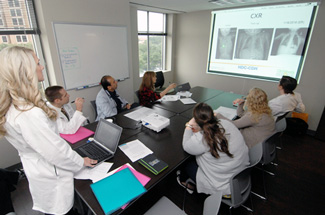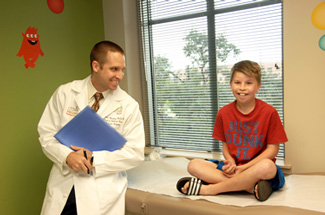Children’s Memorial Hermann Hospital and the McGovern Medical School at UTHealth operate the only long-term multidisciplinary follow-up clinic dedicated to Congenital Diaphragmatic Hernia (CDH) in the southwestern United States. Staffed by a team of CDH experts skilled at meeting each child’s specific needs, the clinic offers parents the convenience of seeing every involved specialist in a single visit under one roof. It also gives doctors the opportunity to collect data and better understand the challenges faced by families of children with CDH.
Why Is Long-Term Follow-Up Important and What Can I Expect at This Clinic?

At the clinic, affiliated pediatric surgeons, pulmonologists, pediatricians, nutritionists, gastroenterologists, cardiologists, and developmental psychologists work together as a team to treat the complex disorders associated with CDH. They see patients in a single visit, according to a structured schedule that depends on their age, CDH classification (see below), and the severity of the disorder(s). Imaging scans are done in the morning, and patients see their specialists in the afternoon. This structure allows for the kind of team-based decision-making that can occur only when all doctors are on the same page, managing the needs of your child.
How Long Will My Child Be Seen in the Long Term Follow up Specialty Clinic?
The CDH specialists follow children through the age of 18, when they are considered adults. The number of clinic visits necessary each year depends on the severity of the hernia, the age of the child, and any complications they have. Physicians and families work together to develop the best care plan, customized for each child’s individual needs.
What Long Term Follow up Is Provided to My Child?

How Does the High-Risk Multidisciplinary Clinic for Cdh Help My Child and Others?
Specialists at the High-risk multi-disciplinary Clinic for Congenital Diaphragmatic Hernia track a range of outcomes for all the patients they see. This allows the team to create a rich source of long-term data, learn more about the long-term challenges of CDH, and identify the best interventions for each child.
Doctors tie the data they collect to decisions about future research, enabling researchers to positively impact patient outcomes throughout the timeline of patient care.
Contact Us
If you have any questions, use the online tool below to help us connect with you. To refer a patient or schedule an appointment, please contact our clinic using the information below.
- The Fetal Center
UT Professional Building
6410 Fannin, Suite 210
Houston, Texas 77030
(832) 325-7288
Toll free: (888) 818-4818
Fax: (713) 383-1464
Email: thefetalcenter@memorialhermann.org - Pediatric General & Thoracic Surgery
6410 Fannin Street, Suite 950
Houston, Texas 77030
(832) 325-7234
Email: cdh@uth.tmc.edu
Office Hours: 8 a.m. to 5 p.m. (Monday-Friday except major holidays)
To contact The Fetal Center at Children's Memorial Hermann Hospital, please fill out the form below.